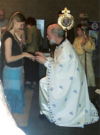Difference between revisions of "Template:Featured"
(Featured 22Dec2007: Chrismation (was Sava the New)) |
|||
| Line 1: | Line 1: | ||
<!--- COMMENT ON [[Category_talk:Featured Articles]] TO GET YOUR ARTICLE FEATURED ---><div style="float:left;margin-right:0.9em;"> | <!--- COMMENT ON [[Category_talk:Featured Articles]] TO GET YOUR ARTICLE FEATURED ---><div style="float:left;margin-right:0.9em;"> | ||
| − | [[Image: | + | [[Image:Chrismation.jpg|100px]] |
<!--nb. portrait images at ~100px, landscape images at ~200px--> | <!--nb. portrait images at ~100px, landscape images at ~200px--> | ||
</div> | </div> | ||
| − | + | '''''[[Chrismation]]''''' is the [[sacrament]] by which a [[baptism|baptized]] person is granted the gift of the [[Holy Spirit]] through anointing with oil. As Baptism is a personal participation in the death and [[Pascha|Resurrection]] of [[Jesus Christ|Christ]], so Chrismation is a personal participation in the coming of the Holy Spirit at [[Pentecost]]. | |
| − | + | Chrismation is often considered the equivalent to Confirmation in the western practise. Although normally administered in conjunction with Baptism, in some cases chrismation alone may be used to receive [[convert]]s to Orthodoxy through the exercise of ''[[economia]]''. The Sacrament of Chrismation can be observed in the New Testament: the [[Acts of the Apostles]] show us that a sort of Confirmation was going on even in the early Church. | |
| − | '''''Recently featured:''''' [[Russian Orthodox Church Outside Russia]], [[ROCOR and OCA]], [[Pascha]], [[Diocese of Washington and New York (OCA)]], [[Book of Kells]], [[Archangel Gabriel]], [[Alexis of Wilkes-Barre]], [[Theophany]], [[Nativity | + | '''''Recently featured:''''' [[Sava the New]], [[Russian Orthodox Church Outside Russia]], [[ROCOR and OCA]], [[Pascha]], [[Diocese of Washington and New York (OCA)]], [[Book of Kells]], [[Archangel Gabriel]], [[Alexis of Wilkes-Barre]], [[Theophany]], [[Nativity]]. ''Newly [[:Category:Featured Articles|featured articles]] are presented on '''Saturdays'''.''<noinclude> |
[[Category:Main page templates|Featured]]</noinclude> | [[Category:Main page templates|Featured]]</noinclude> | ||
Revision as of 07:04, December 22, 2007
Chrismation is the sacrament by which a baptized person is granted the gift of the Holy Spirit through anointing with oil. As Baptism is a personal participation in the death and Resurrection of Christ, so Chrismation is a personal participation in the coming of the Holy Spirit at Pentecost.
Chrismation is often considered the equivalent to Confirmation in the western practise. Although normally administered in conjunction with Baptism, in some cases chrismation alone may be used to receive converts to Orthodoxy through the exercise of economia. The Sacrament of Chrismation can be observed in the New Testament: the Acts of the Apostles show us that a sort of Confirmation was going on even in the early Church.
Recently featured: Sava the New, Russian Orthodox Church Outside Russia, ROCOR and OCA, Pascha, Diocese of Washington and New York (OCA), Book of Kells, Archangel Gabriel, Alexis of Wilkes-Barre, Theophany, Nativity. Newly featured articles are presented on Saturdays.
